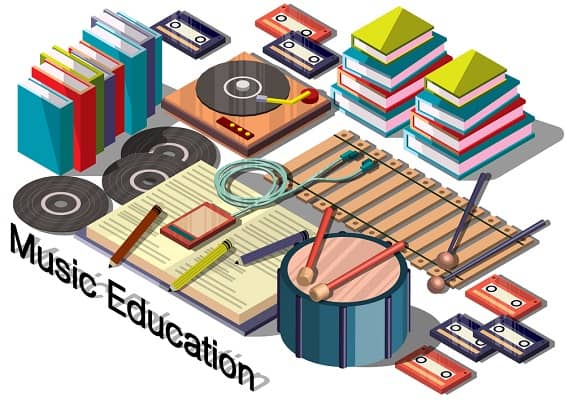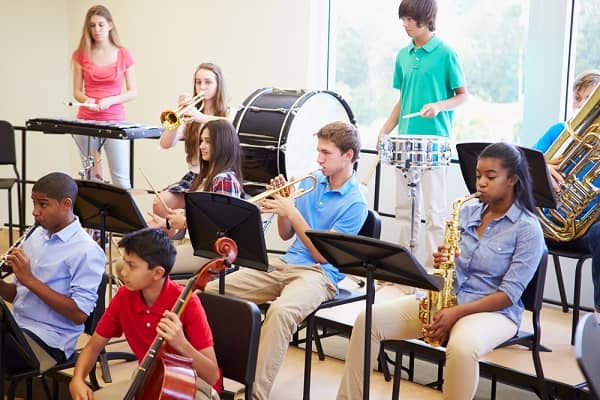Music education degrees empower students to not only master an instrument or vocal style but also build communication, creativity, confidence and other critical skills.
Pursuing a bachelor’s or master’s degree in music education paves the way for meaningful careers sharing the gift of music with others. It also leads to improved quality of life through deeper musical understanding and valuable transferable abilities.
You should read this article because it explores the rewarding career paths, enrichment of life through music, and development of crucial transferable talents that music education degrees confer.
Benefits of Music Education Degree
A music education degree provides numerous benefits beyond the ability to teach and perform music. Let’s check out the details:
1. Boosts Students’ Overall Academic Performance
Numerous research studies have demonstrated that music education leads to improved cognitive skills, higher test scores, and increased high school graduation rates.
So while you may have joined band practice just for fun, all those hours spent learning music theory likely provided academic benefits too!
Enhanced Cognitive Abilities
Learning to sing or play an instrument engages multiple regions of the brain, causing it to work harder as it integrates sensory, motor and cognitive information. This leads to enhanced critical thinking, memory, reasoning and concentration skills.
According to a study by Peter Gouzouasis and colleagues at the University of British Columbia, students who participate in music-related activities between grades 7-12 achieve significantly higher scores on science, math, and English exams in high school than non-musical classmates.
So if you spent years taking weekly piano lessons or practicing violin scales, you were essentially giving your brain a full workout!
Those musical endeavors didn’t just teach you to play or sing well; they actually improved core cognitive abilities that could assist you across all academic subjects.
Higher Test Scores
In addition to stronger cognitive aptitude, research has found that students actively engaged in music education programs score better on standardized tests.
According to a study by Kenneth Elpus at the University of Maryland published in the Journal of Research in Music Education, data from 13,530 American high school sophomores showed that students who earned at least one music course credit scored higher on average in SAT compared to students without music course credits.
Similar positive associations exist between music education and improved literacy, mathematics achievement and IQ test results.
So while your non-musical classmates were cramming vocabulary words the night before the SAT, all those hours spent rehearsing for the school musical likely gave your test scores a solid boost!
Increased High School Graduation Rates

Not only does involvement in music education improve test results, but it also correlates to higher high school graduation rates.
According to a study published in the Spring 2022 issue of the Journal of Youth Development, elementary school students who participated in Harmony Project, an after-school program providing four hours per week of music lessons and mentoring, showed significantly improved reading and math scores after two years when compared with students who didn’t participate.
These findings indicate that along with stronger cognition and test-taking abilities, disciplined involvement in music education fosters skills that keep students engaged and on track to graduate.
So if you credit your high school band teacher for keeping you invested enough to make it to graduation day, the statistics support your experience! Musical engagement helped you cross the finish line.
2. Developed Core Competencies
Gaining firsthand knowledge of how music participation benefits students academically may have drawn you to pursue an online music education degree. But beyond preparing you to facilitate students’ artistic and cognitive growth, these programs provide training across three key areas:
Pedagogical Expertise
Comprehensive music education degrees don’t just teach you how to play an instrument really well. They provide critical training in child development, tailored instruction strategies and classroom management techniques.
This pedagogical foundation establishes best practices for motivating students across diverse backgrounds and ability levels to maximize their musical skill retention and academic achievement.
Coursework covers everything from band conducting 101 to techniques for adapting sheet music complexity levels based on skill. Graduates gain the methodological toolkit to foster student confidence, meet them at their level, and help them progress. These vital competencies allow music educators to successfully structure programs facilitating growth for every child.
So whether you teach fourth graders recorder or high schoolers Handel sonatas, a music education degree offers the pedagogical foundation to help them excel.
Musical Mastery
While strong pedagogical skills establish student motivation and engagement, there also must exist a passion for music itself. Music education degree programs like Master of Music provide immersive training in music theory, history and practical techniques tailored to one’s area of specialization.
For vocalists, that means supervised practice expanding range and style versatility through varied repertoires. Instrumentalists develop technical precision through scales, etudes and complex solo work.
Classical dancers take daily classes focused on body awareness, alignment and holistic health essential for injury prevention and career longevity.
This musical mastery component of music education degrees enables graduates to provide expert training in their creative disciplines. Students respect and connect more profoundly to teachers who walk the walk.
And nothing builds trust with young musicians faster than being able to jam out tight eight notes on the trumpet or nail the timing of a pirouette sequence.
Leadership Capabilities
In addition to pedagogical and performance-based expertise, impactful music educators require leadership skills to develop curricula and manage programs at their schools. Music education degrees train graduates not only to teach students but also to run multifaceted performing ensembles within institutional frameworks.
Courses explore budget planning, community partnership coordination, resource allocation and season programming. Assignments task students with drafting custom curricular blueprints tailored to demographics and infrastructure at hypothetical schools.
This administrative preparation provides graduates with a start-to-finish understanding of what it takes to build a high-functioning music education program.
So whether you dream of directing your own children’s choir program or becoming a school district’s director of bands, music education degrees offer targeted leadership development opportunities.
3. Fulfilling Careers Powered by Music Education
After gaining well-rounded training and expertise across the music education landscape, what career paths become available? While teaching jobs represent popular options, leadership roles directing university departments or entire district programs also draw many graduates.
Here is an overview of some of the most common and fulfilling careers powered by music education degrees:
Primary/Secondary School Educators

Many music educators utilize their degrees to teach in elementary, middle or high schools. Responsibilities range from planning daily general music classes for young students to directing advanced ensembles like jazz bands and chamber orchestras.
These teaching-based careers represent the most abundant employment outlet for music education graduates. The job growth outlook remains positive as well.
So whether you hope to introduce beginner violin to third graders or push AP Music Theory students to earn college credits, primary and secondary schools offer stable jobs and rewarding environments to utilize music education degrees.
Private Music Instructors
For those desiring flexible schedules and higher control over lesson planning, private music instruction provides an alternate education-based career choice.
Teachers offer customized lessons tailored to each student’s ability level and musical tastes from home studios or rented spaces. Setting one’s own hourly rate and student capacity provides increased income control.
However, a passion for educating others remains imperative regardless of the work environment. Patience paired with creative communication abilities is vital for structuring sessions effectively across potentially diverse student pools.
Business operations like marketing and accounting also fall under the private instructors’ responsibility umbrella.
So whether coaching youth rock bands in your garage on weekends or teaching jazz piano to adult hobbyists on Tuesday nights, professional music lessons allow you to follow your own hours while helping students grow.
Performers
For some music education graduates, their degree foundations empower dual careers as teachers AND performers. Many maintain studios while simultaneously gigging, composing and recording their original works.
Others gain fame through talent competitions like “The Voice” or “America’s Got Talent,” using their television platforms to subsequently advocate for music education.
No matter how notoriety comes, these educators-turned-entertainers enjoy the thrill of channeling their creativity into both live shows and classroom lessons. They personify the power of music education by demonstrating its full embodiment firsthand.
So if you dream of vocalizing alongside Ariana Grande at Coachella one day while still teaching pop vocals on the side, music education degrees offer flexible launchpads for integrated creative careers.
Higher Education Faculty
Instead of facilitating music learning through private or K-12 settings exclusively, many music graduates leverage their advanced credentials to teach full-time at colleges and universities. Faculty members split responsibilities between educating students and conducting original research.
From lecturing musicology courses to leading graduate student teaching cohorts, faculty engage with young artists through a multifaceted higher educational lens.
These careers also provide opportunities to direct university ensembles, supervise student teachers in training, or operate programmatic elements like summer music camps.
For those excited by academia’s probing nature who hope to inspire postsecondary students, university-level music careers promise profound fulfillment. Educating adult learners eager to earnestly debate melodic dictation strategies or rehearse concertos for hours channels music degrees toward rich human connection.
School District Administrators
For music educators seeking to broaden their leadership influence beyond just students in their own classroom, administrative careers managing entire district programs offer impactful outlets.
As directors, coordinators and supervisors, they oversee curriculum development, budgeting/purchasing, teacher hiring and community partnerships across all schools within their cities or regions.
Overseeing the complete infrastructure enabling music education – not just facet delivering it – allows these professionals to advocate for the arts on a larger scale. They utilize macro vantage points to spearhead funding initiatives, shape scheduling priorities and pilot innovations enhancing access and resources.
So whether you enjoy shaping big-picture visions or find excitement in rallying stakeholders around a common purpose, music administrative careers empower you to positively guide all local music learners’ journeys.
Music Education Programs Offer Multifaceted Preparation
A music education degree equips you with diverse, real-world skills to make a positive impact across artistic, educational, and community settings. Whether you hope to teach students, conduct professional ensembles, or uplift lives through music therapy, this multifaceted training provides relevant knowledge and experience.
Coursework builds specialized musical expertise while prompting you to synthesize learning into original teaching programs. An understanding of music history informs stylistic mastery. Most of all, a music education degree allows your passion, skill and vision to empower generations to realize their creative potential.
Just as you were transformed by those special mentors introducing music’s gift, you can pay it forward to unlock artistic journeys for others. Through this harmonizing of talents and dreams, you hit the most resonant chord of all – spreading lifelong musical joy.
Frequently Asked Questions
Can you teach music without a music education degree?
Yes, you can teach music without a degree, but you won’t be able to teach in schools, which require certification. You can teach privately if you have strong musical and teaching abilities.
Can you get a music education degree online?
Yes, you can obtain a music education degree online from accredited colleges and universities.
Reputable options include Berklee Online for personalized programs in various music areas, top-ranked bachelor’s programs on BestColleges lists, and the University of Southern Mississippi‘s online master’s in music education for current teachers.
These flexible programs cover music theory, composition, production, and other relevant areas.
What is the highest degree in music education?
The highest degree in music education is the Doctor of Philosophy (Ph.D.) in Music, which involves advanced research and academic writing.
The Doctor of Musical Arts (DMA) is also a terminal degree, focused on intensive performance or composition training combined with independent research.
About the Author
Team Guitar Top Review Talk about Guitars! We are a group of friends that bonded over their shared love of playing guitar. We all have different backgrounds and experiences with music, but we share a passion for writing about the things that we love.


